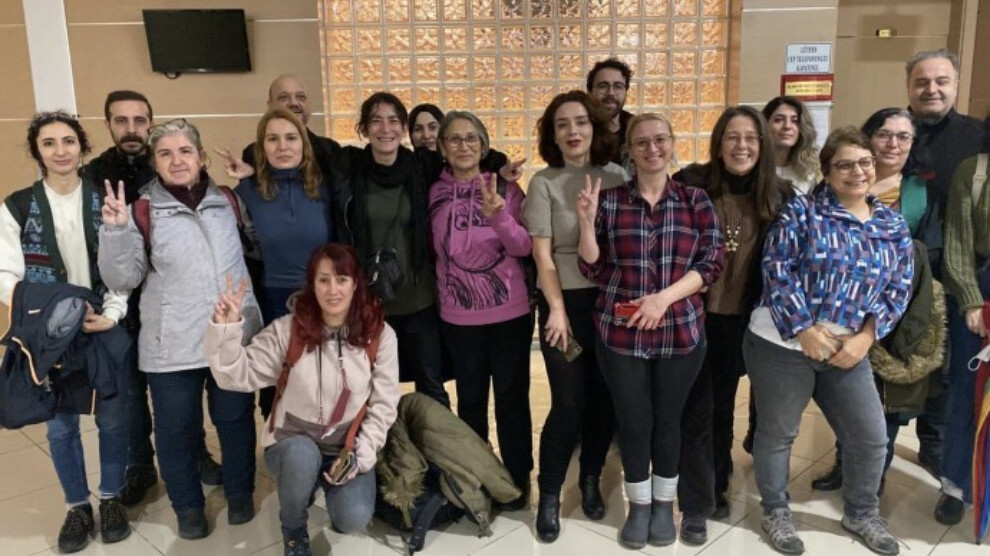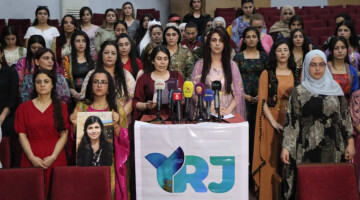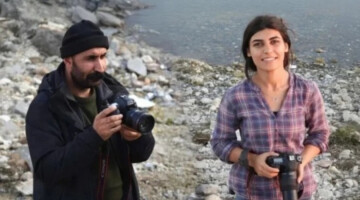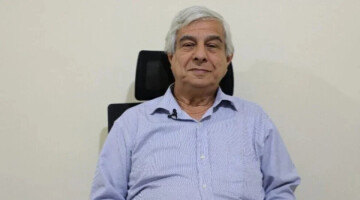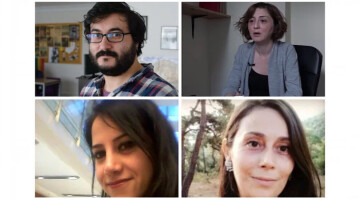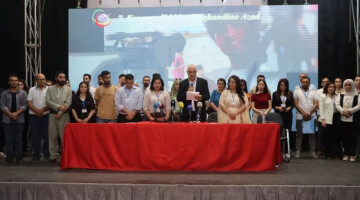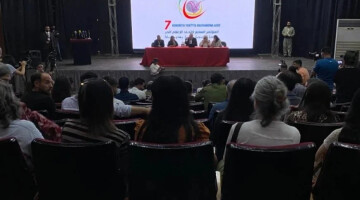The first hearing of the lawsuit filed against journalists Serpil Ünal, Yadigar Aygün, Pınar Gayıp, Eylem Nazlıer, Zeynep Kuray and Esra Soybir, who gathered in Kadıköy on April 29, 2023, to protest the operations against free press workers in Amed (Diyarbakır) and were beaten and detained was held in Istanbul on Wednesday.
The hearing of the journalists, who are accused of "participating in unlawful assemblies and marches without weapons and not dispersing spontaneously despite a warning" was held at the 22nd Criminal Court of First Instance at the Anadolu Courthouse. All journalists except Esra Soybir were present at the hearing. Many personalities from the press and legal organizations followed the hearing.
Gayip: We were subjected to violence
Pınar Gayıp, editor of Etkin News Agency (ETHA), who made her defense after the identification, stated that the police chief she met before the protest told her that there was no ban order. Pointing out that they learned about the banning order at the protest site, Gayıp said that they were prevented on the grounds of "blocking the road". She stated that they were subjected to swearing and violence by the police and said, "The reason for the ban was our call for solidarity with Kurdish journalists because the mainstream media labeled our fellow journalists as 'terrorists' at the time."
Kuray: Solidarity is being criminalized
"The police deliberately allowed us to gather and detained us," journalist Zeynep Kuray said. Emphasizing that professional solidarity is not a crime, Kuray said, "I was going to join the protest. Pınar told me it was 'forbidden'. At that moment, the police surrounded us. I went there to stand up for my colleagues. I did not accept these bans and I unfurled the banner 'Free press cannot be silenced'." Kuray emphasized that solidarity with the Kurdish press was being crimanilized.
'If there is a criminal, it is the police'
Stating that journalists were beaten, Kuray said, "Anyone can make a press statement for journalists. Why is this forbidden to us? We also faced unlawfulness during the 'FETÖ' era. They are in jail now. We face the same lawlessness every time. I am proud to stand in solidarity with my colleagues. I will never give up solidarity with them. If there is a criminal here, it is the law enforcement, the police."
Aygün: We will defend Kurdish journalists
Gazete Patika reporter Yadigar Aygün said that she was handcuffed behind her back even though she stated that she has a heart disease. "The AKP targeted the Kurdish press before the elections and carried out operations against the Kurdish press. This detention was arbitrary. There are still protests there, no one interferes. Also, the decision was taken very suddenly. I was harassed, slapped in the face. Why aren't those who sued us being prosecuted? We will always defend Kurdish journalists. Many of them are in prison, I will continue to defend them. The real criminals are those who filed this case unjustly and unlawfully."
Ünal: We were detained through torture
Serpil Ünal, a reporter for Mücadele Birliği newspaper, said, "We were detained with very heavy torture. When they tried to pull me up, I fell to the ground. When my friends intervened, the police attacked them too. We filed a complaint against them. Our hands were bruised due to the tightness of the handcuffs. We demonstrated for the release of Kurdish journalists because they were detained for reporting news."
Nazlier: I will continue to defend my colleagues
Evrensel newspaper reporter Eylem Nazlıer stated that it was not a coincidence that they were put on trial on January 10, Working Journalists' Day, and described the violence they experienced. Nazlıer stated that during the prevented demonstration, they were going to say that "the reasons for the detention of our friends were their professional activities and that journalism cannot be put on trial".
Nazlıer continued: "Journalist Metin Göktepe was tortured to death in detention on January 8, 1996. We were being murdered in the darkness of the 1990s, and now we are being intimidated through detentions and arrests. I work at the newspaper Göktepe had worked for, a newspaper that paid a price. I know the weight of this very well. I participated in the protest that day because I know this. We come from the tradition of journalist Metin Göktepe. I do not accept what the police told me: 'You will learn to shut up'. I will continue to defend my colleagues and my profession."
Request for acquittal
Ümmühan Kaya, one of the journalists' lawyers, recalled the articles in international conventions and the constitution and said that her clients had not committed a crime. Kaya said, "They met with the police and the police said there would be no problem. But at the last minute they detained the journalists. It alarms me that our clients were beaten and detained in this way. How can the police behave so unlawfully? Journalists are being tried here today despite being subjected torture. I demand the acquittal of our clients."
Hearing adjourned
The lawyers demanded that the footage of the detentions and the Kadıköy Governorate's "banning" order be included in the file. The court accepted the lawyers' demands and adjourned the hearing to April 16.

